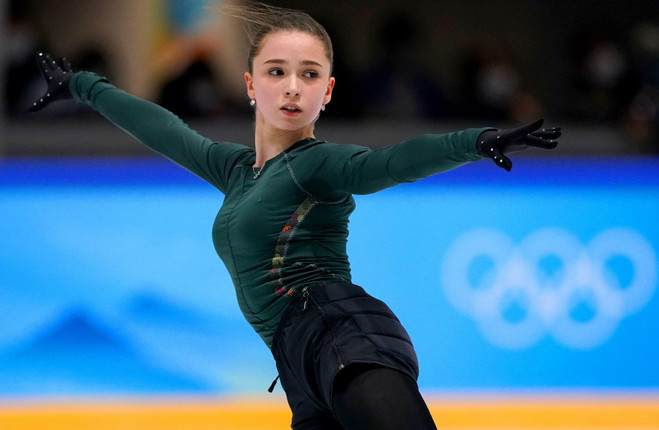RUSSIAN TEENAGE FIGURE skater Kamila Valieva can compete again at the Beijing Olympics after sport’s top court said on Monday that she should not be suspended for failing a drugs test.
In a case that has rocked the Games, the Court of Arbitration for Sport (CAS) ruled that the prodigious 15-year-old could take part in the women’s singles event that begins on Tuesday.
The young Russian will be favourite to win but she has not been cleared of doping and could still face punishment at a later date.
CAS said it had rejected appeals by the International Olympic Committee, the World Anti-Doping Agency and the International Skating Union to have the suspension reinstated after it was lifted by Russian anti-doping authorities.
The court cited “exceptional circumstances”, including Valieva’s status as a “protected person” – in other words, a minor.
Matthieu Reeb, CAS director general, said: “The panel considered that preventing the athlete to compete in the Olympic Games would cause her irreparable harm in these circumstances.”
CAS also emphasised that “there were serious issues of untimely notification” of the result of the test.
Valieva took the test on 25 December but the result was only produced last week, after she had led Russia to team gold.
“Such late notification was not her fault, in the middle of the Olympic Winter Games,” the ruling said.
The Russian Olympic Committee hailed the decision, saying: “Tomorrow the whole country will support her and all our wonderful female skaters in the individuals competition.”
The US Olympic and Paralympic Committee though said it was “disappointed by the message this decision sends”.
“This appears to be another chapter in the systemic and pervasive disregard for clean sport by Russia,” it said in a statement.
Valieva tested positive for trimetazidine, which is used to treat angina and vertigo but is banned because it can increase blood flow efficiency and help endurance for athletes.
It took six weeks for the result of the test to be processed by a WADA-accredited laboratory in Stockholm.
The Russian anti-doping agency (RUSADA) was notified of the positive result on 8 February and suspended Valieva, but she successfully appealed and the suspension was lifted.
RUSADA has said it was informed that the sharp rise in Covid-19 cases at the start of the year was the reason for the delay.
“We would not have this case and I would not be here if these anti-doping test procedures would have been completed in one week or 10 days,” Reeb said.
The Stockholm laboratory declined to comment.
The day before she received the result, Valieva helped Russia win the figure skating team title in Beijing, producing a dazzling performance as she became the first woman to land a quadruple jump in Olympic competition.
As the legal arguments over Valieva raged in the background last week, the award ceremony for the team event was cancelled.
Before the CAS decision was announced, the International Olympic Committee said Monday that the team event medals would probably not be awarded during the Games.
“It’s something that’s regrettable but we have to follow the process of CAS and the legal process,” IOC spokesman Mark Adams said.
“It’s a dilemma we are all in and it’s something we’re not happy with.
“All the other issues will have to be discussed further into the Games and that will include the presentation of the medals to the teams.”
The United States won the silver medal in the team event and Japan took the bronze, with Canada fourth.
The case raises questions about the welfare of the girl at the midst of the latest Russian doping scandal at an Olympics.
The IOC has urged WADA to investigate Valieva’s entourage, which includes highly successful coach Eteri Tutberidze.
CAS’s decision will be intensely scrutinised because Russia is already under sanctions for a massive state-sponsored doping programme that reached its peak at the 2014 Sochi Winter Olympics.
As a result, Russians are competing in Beijing only under the flag of the Russian Olympic Committee (ROC),
In Monday’s sports action, Californian-born Eileen Gu, the face of the Games after winning freestyle skiing gold for China last week, held her nerve to qualify for the slopestyle final.
The 18-year-old sensation was down in 11th place after a mediocre first run, and with only the top 12 going through to Tuesday’s final, the pressure was on.
Gu duly delivered, her score of 79.38 enough to take her into the final in third place.
French figure skaters Gabriella Papadakis and Guillaume Cizeron won Olympic gold in ice dancing, breaking their own world record again in the process.
Papadakis, who suffered a problem with her costume that cost the pair the gold medal four years ago, said: “I think we don’t believe it yet. Honestly it feels completely unreal.
“We have been waiting for this. This is the medal that we wanted.”
The42 is on Instagram! Tap the button below on your phone to follow us!

